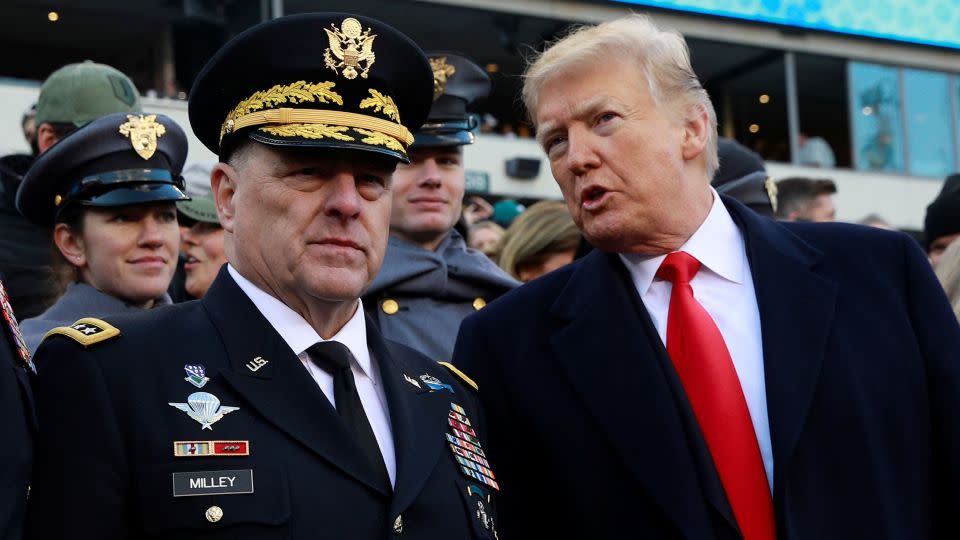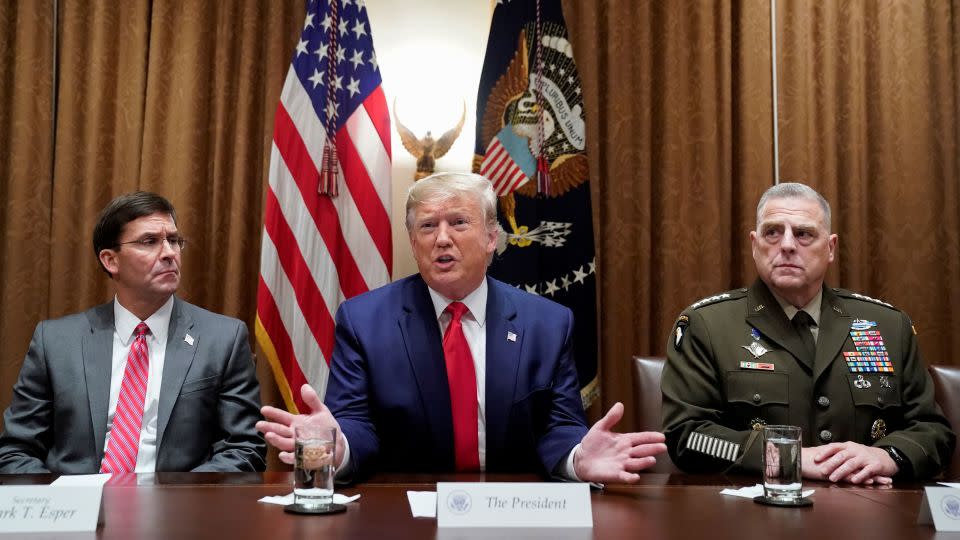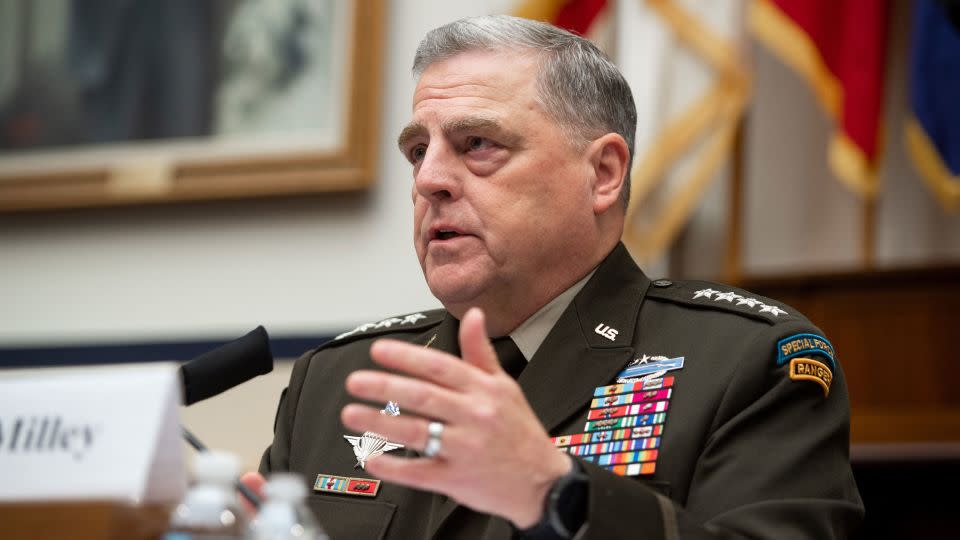Mark Milley leaves a controversial legacy as America’s top general
- Oops!Something went wrong.Please try again later.
- Oops!Something went wrong.Please try again later.
- Oops!Something went wrong.Please try again later.
Every morning, Gen. Mark Milley’s staff pulls transcripts from Fox News prime-time shows to see if they’re talking about him.
Those transcripts sometimes become part of the glut of media materials that Milley consumes on a given day from the major papers, the morning news shows and tweets that he almost certainly reads from an anonymous X profile.
In some ways, it’s a pragmatic practice: Fox anchors such as Sean Hannity and, at one point, Tucker Carlson routinely attack Milley – and during the Trump years, there was also a reasonable expectation that the president would be talking to the hosts of those shows.
But it’s also a telling habit for the chairman of the Joint Chiefs of Staff, the president’s top military adviser. Since being appointed to the job by then-President Donald Trump in 2018, Milley has, either by choice or by circumstance, proved intensely attuned to the politics surrounding the military – and, his critics say, his own legacy.
As he prepares to depart the office this week, Milley is considered one of the most politically nimble chairmen in modern history but also one of its most divisive. His defenders say Milley was simply responding to what has been an unprecedented climate of political discord and that he acted with honor and integrity to protect the Constitution. His Republican critics say he has inflicted long-term damage to the role of chairman, a position designed to be strictly apolitical.
But what is clear is that Milley has appeared to thrive at navigating the bureaucratic realpolitik of Washington, DC – even as he rejects any characterization of himself as a political operator. He survived in the role under both Trump and President Joe Biden, helping steer the country through the domestic political upheaval of 2020, the chaotic withdrawal from Afghanistan and the high-stakes maneuvering around the war in Ukraine.
“He’s the consummate political general in that he, of course, would go out of his way to counter-message that he was not a political general, by God, he was a muddy-boots general,” said one former senior Defense Department official.
Interviews with 10 current and former military and civilian sources who have interacted with Milley across his tenure as chairman paint a picture of a career soldier who often saw himself as standing in the breach, defending democracy itself from an unscrupulous president. He became adept at “managing up” under Trump, his defenders say, and was able to prevent some of the former president’s wilder impulses from becoming reality without being fired.

One of Milley’s methods for dealing with Trump’s mercurial demands was maintaining a judicious silence. Despite Trump’s frequently outlandish threats – often issued on social media – the former president rarely gave out direct orders as commander in chief. Milley would listen to the torrents and stay quiet. Without an order, there was no need for him to jump in.
After the controversies of the Trump years, it wasn’t clear to Milley or his team where he would stand with the incoming Biden administration.
Instead, Milley quickly forged a close working relationship with Biden, even as he sometimes found himself out of step with the president’s national security adviser, Jake Sullivan. Especially on Ukraine, Biden’s public comments often echoed Milley’s private language, a sign of just how much Milley had the president’s ear at times.
An easy talker, Milley is able to toggle seamlessly between a bombastic, hockey-playing soldier and an Ivy League scholar of war. (Milley went to Princeton and majored in political science.)
“He has been in uncharted ground for a uniformed officer,” said former Army Secretary Ryan McCarthy. “But we’re on uncharted ground as a country.”
Tactician vs. strategist
Inside the Pentagon, Milley is known for being steeped in the on-the-ground minutiae of military conflict. An infantryman at heart, Milley knows the details, down to the number of artillery tubes Ukraine keeps at one location vs. another.
Multiple military officials with direct experience working with Milley, including one senior officer, described an ongoing internal debate about whether his deep involvement in nitty-gritty tactical details has distracted him from the more high-level strategic thinking required of a chairman.
“The level of tactical details being talked about between the chair and the secretary is insane,” said another military official. “I didn’t know we were all lieutenants and captains today!”
The other, more pressing debate for civilians and military officials alike inside the Pentagon is whether Milley’s handling of the rolling, unprecedented crises of the Trump era were one-offs necessary to preserve democracy – or whether he broke norms and irrevocably changed the apolitical role of the chairman of the joint chiefs.
Opinions are as varied as the results of a Rorschach test.
The chairman is not a part of the chain of command and, in theory, is intended to act in a purely advisory capacity to the president. Milley’s conduct, in ways large and small, was unquestionably extraordinary in the final months and days of the Trump administration.
Two days after the January 6 attack on the US Capitol, Milley – concerned that Trump “had gone into a serious mental decline” and might “go rogue” – instructed senior operations officers from the National Military Command Center not to take orders from anyone unless he was involved, according to Bob Woodward and Robert Costa’s book, “Peril.”
Contentious relationship with Trump
In the final 60 days of the Trump administration, the former president dismissed Secretary of Defense Mark Esper and sent several unconfirmed officials to take temporary control of the Pentagon. Two former defense officials under Trump described Milley as blocking or “black-holing” some of the policies that they sought to push through in the waning days of the administration.

In one of the most hotly debated episodes of Milley’s tenure, he appeared briefly alongside President Trump as he walked to a church outside of Lafayette Square for a photo op during the George Floyd protests. Milley, who was in uniform, later apologized publicly for “creat[ing] a perception of the military involved in domestic politics.” The apology outraged Trump.
There were other times that Milley’s comments were directly at odds with the president. In summer 2020, he backed the effort to rename Army bases named for Confederate generals and testified before Congress that Confederate leaders had committed “treason.”
A former senior aide to Milley said that the chairman understood that Washington is an inherently political environment, and that even as he sought to keep the military apolitical, he had to work with members of both parties to do his job.
It was a lesson Milley learned as a colonel serving as the military assistant to former Defense Secretary Robert Gates, according to Gen. Andrew Poppas, who served as director of the Joint Staff under Milley from 2020 to 2022. The chairman got a “master class” in the “inner workings” of DC’s political environment, Poppas said.
Target of Republican attacks
By the end of the Trump administration, Milley had become one of the biggest targets for the far right. Republican lawmakers and former Trump administration officials have accused him of undermining the sacrosanct principle of civilian control of the military.
“Milley allegedly placed military hands – his hands – on controls that belong exclusively to the president,” Sen. Chuck Grassley, an Iowa Republican, said during a 2022 Senate floor speech in response to the revelations in “Peril.”
Milley’s “brazen words and actions strike at the heart of our democracy – civilian control of the military – and show utter contempt for the commander in chief,” Grassley said.

Milley’s defenders say that by January 2021, the US was approaching a moment of supreme emergency that required some breaking of norms to ensure a democratic future. Milley stepped into the breach – and perhaps was uniquely suited to do so, because he was both savvy to the internal politics of government and a big enough personality to stand up to Trump.
Under the Biden administration, he has continued to face fierce criticism from the right over hot-button culture war issues inside the US military. To GOP lawmakers like Rep. Matt Gaetz, Milley has engineered a “woke” military that isn’t capable of fighting wars – a charge that Milley has refuted.
“This military is a lot of things, but woke, it’s not,” Milley told CNN’s Fareed Zakaria this month. “So I take exception to that. I think that people say those things for reasons that are their own reasons, but it’s not true.”
He made a similar point even more vociferously in a heated exchange with lawmakers on the House Armed Services Committee in 2021, saying accusations that the military was becoming too “woke” were “offensive.”
A more traditional role under Biden
Under the Biden administration – with the specter of a democracy in danger less of a daily concern – Milley has molded himself into a far more traditional chairman. The role exists as a military adviser to the president and is outside of the chain of command; Milley, by all accounts, has fulfilled that role.
Still, the opinionated Army general found himself out of step with the administration on two major occasions: the Afghanistan withdrawal and Ukraine negotiations. Milley believed the US military should remain in Afghanistan, a position he argued during interagency meetings before Biden made the final decision to withdraw.
When that decision came, it was one Milley accepted.
“He’s a professional,” Poppas said. “He respects the chain of command.”

The execution of the withdrawal became a black eye for the Biden administration and the US military. Thirteen US service members died and the world watched in horror as desperate Afghans clung to the wheel wells of departing American planes.
A year and a half later, Milley found himself alone once again. This time, the topic was Ukraine, and – unlike the rest of the administration – Milley argued there was a potential window for negotiations as the fighting entered its first full winter. At the Economic Club of New York in November 2022, Milley posited that neither side could achieve military victory “and therefore you need to turn to other means.”
This time, his Ukrainian counterpart, Gen. Valerii Zaluzhnyi, a man with whom he has spoken nearly every week since the war began, shot him down. According to his Telegram channel, Zaluzhnyi told Milley several days later that “there is only one condition for negotiations – Russia must leave all the occupied territories.”
In other instances, Milley has subtly disagreed with Sullivan, the president’s national security adviser. As the recent Ukrainian counteroffensive has dragged into the fall without any major breakthroughs, Sullivan had begun to express some impatience with Kyiv’s progress. Milley, in at least one recent meeting, argued that it wasn’t fair for the United States, which is not on the ground, to judge Ukraine’s handling of the offensive too harshly.
It’s a sentiment he has expressed in public, too.
“War on paper and real war are different. In real war, real people die,” Milley told an audience at the National Press Club in Washington earlier this year. “Real people are on those front lines and real people are in those vehicles. Real bodies are being shredded by high explosives. … It’s going to be very long, and it’s going to be very, very bloody. And no one should have any illusions about any of that.”
During an August gaggle with reporters at the White House, Sullivan echoed Milley’s sentiments on Ukraine, saying, “Ukrainians are operating according to their tactics and their timetable, making progress according to the strategic and operational decisions of their commanders and their leadership, and we’ll continue to support that.”
Milley is a voracious reader, and after he retires, he is considering doing what many former officials do: writing a book.
The topic?
Leadership in crisis.
For more CNN news and newsletters create an account at CNN.com

